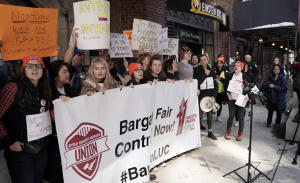Graduate Workers Under Attack



Yet graduate workers – the extremely bright master’s and PhD students who do much of the research, teaching and grading on campuses nationwide – often live in poverty with no benefits or access to affordable health coverage just to get an education.
Like other educators, fast food workers, auto workers, hotel workers and nurses, graduate workers work hard and many have to care for families on their extremely low pay.
That’s why since their right to come together in a union was formally recognized, we have rapidly formed our unions. More than 25,000 graduate workers at 24 schools have used to the NLRB process since 2016. And we’ve won big changes on many campuses including stipend increases to $31,000 a year, meeting their demand for $15/hr full-time pay, paid parental leave and more.
Making graduate jobs good jobs has started to open up advanced degrees to people who for too long couldn’t dream of pursuing an education while working for years without real pay.
 WHAT HAS CHANGED? Now, in response to their momentum, the Trump-appointed Labor Board has announced plans to rig the rules against them. That could put all the gains they’ve made at risk and allow universities to keep taking advantage of our hard work and paying us poverty wages, all while claiming they aren’t even workers.
WHAT HAS CHANGED? Now, in response to their momentum, the Trump-appointed Labor Board has announced plans to rig the rules against them. That could put all the gains they’ve made at risk and allow universities to keep taking advantage of our hard work and paying us poverty wages, all while claiming they aren’t even workers.
That’s why graduate workers across the country are rising up. They’re demanding that the Labor Board respect their rights, universities do the right thing regardless of unjust laws and that elected officials join them in fighting back for a voice on the job through their union.
It’s time that bad politicians, the rich and employers stop working together to rig the rules against working people. We’re calling for an end to tricky work arounds and legal tactics that leave too many of us without a say. It’s time for unions for all.
WHAT CAN BE DONE? Hope is not lost! There’s plenty to be done. In addition to spreading the word, we can slow down and impact the process by flooding the National Labor Relations Board with as many public comments as possible. They are legally required to respond to each significant comment on a different topic, so the more we can submit, the better. We can also contact our legislators and demand they defend our rights.
